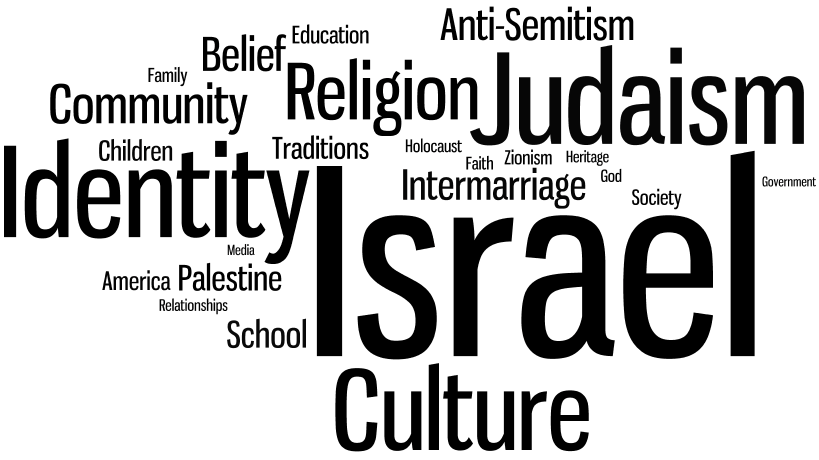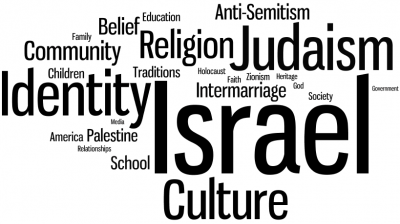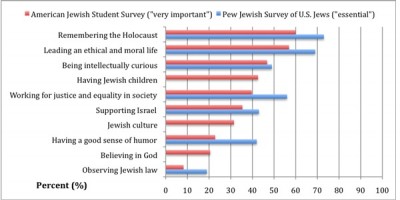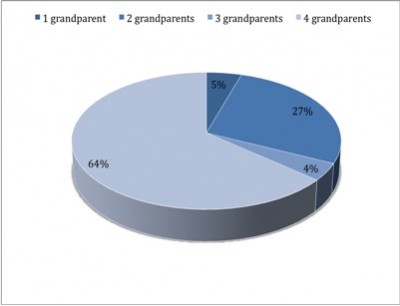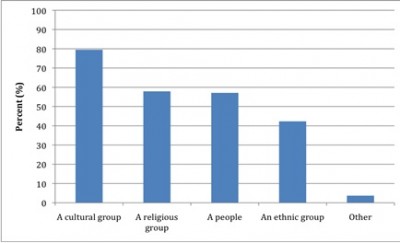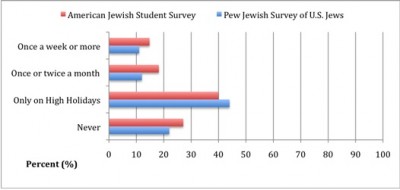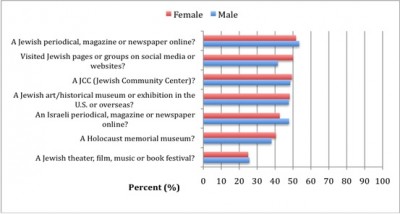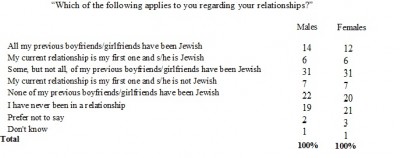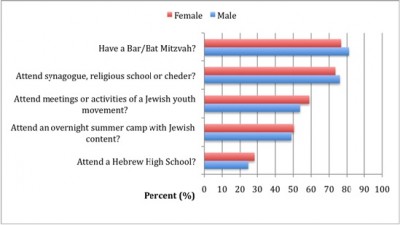Preliminary results of the Demographic Survey of American Jewish College Students 2014 are out. Started last spring by Drs. Barry Kosmin and Ariela Keysar at the Trinity College Institute for the Study of Secularism in Society and Culture, this is the first comprehensive scientific survey ever of an underrepresented and under studied demographic: American Jewish college students. They polled 1,157 self-identified Jewish students across the country on a number of key issues to find out what’s on the minds of the next Jewish generation. So, according to their findings, what are the crucial issues facing young Jews today? Kosmin and Keysar prepared this Wordle of student answers to that question:
Chart 1
“In your opinion, what are the crucial issues concerning young Jewish people like yourself today?”
Source: Demographic Survey of American Jewish College Students 2014
That should look about right to anyone who has been reading New Voices. Besides this, here are 8 other survey responses the researchers have chosen to highlight at this time. Below are Kosmin and Keysar’s questions followed by charts they prepared with the early results.
Chart 2
“How important is each of the following to what BEING JEWISH means to you personally?”
Source: Demographic Survey of American Jewish College Students 2014
Chart 3
“Thinking about your grandparents, how many are/were Jewish?”
Source: Demographic Survey of American Jewish College Students 2014
Chart 4
“When you think what it means to be a young Jew in America today, would you say that it means being a member of …”
Source: Demographic Survey of American Jewish College Students 2014
Chart 5
“Aside from special occasions like weddings, funerals and bar mitzvahs, how often do you attend Jewish religious services at a synagogue, temple, minyan?”
Source: Demographic Survey of American Jewish College Students 2014
Chart 6
“In the last 12 months, have you visited…”
Source: Demographic Survey of American Jewish College Students 2014
Chart 7
“Which of the following applies to you regarding your relationships?”
Source: Demographic Survey of American Jewish College Students 2014
Chart 8
“When you were growing up, did you…”
Source: Demographic Survey of American Jewish College Students 2014
New Voices Analysis:
As tends to happen with survey results, in some ways these are surprising, and in some ways they are not. It is intriguing that in spite of being raised with almost the same amounts of participation in Jewish institutions as their parents, as seen in Chart 8, most of the results show Jewish Millennials have the same priorities as their parents, except less so; in other words, those who are involved care about many of the same things as their parents, there are just fewer who care. The biggest exception to this is religion—though Millennials are more likely to see their Jewishness strictly in cultural terms, those who do relate to it religiously are more involved. This seems to speak to the larger trend of our generation’s loathing of lip-service—if we believe, we take it seriously (even if we take it seriously in a non-traditional way) and if we don’t believe, why bother with it at all? Of the twice-a-years, it would be very interesting to see who goes with their families and who goes on their own.
This trend shows itself further in Chart 2. We view what it means to be Jewish similarly to the previous generation (again, just in smaller percentages), with the notable exception of having a sense of humor. A lot of this, I think, has to do with us growing up in a more multicultural world—we know lots of funny people of all kinds, and anyway, having a good sense of humor isn’t really something to build a whole cultural identity around, certainly nothing to go out of your way to perpetuate. This also explains why there are so many fewer in this generation who feel “Leading an ethical and moral life” and “Working for justice and equality in society” are important than in the previous generation—it’s not that we don’t feel these things are important, it’s just that we don’t feel like we need to be Jewish in order to care about them.
The bottom line for this survey of course is the lower levels of Jewish engagement for young Jews across every category (roughly 10% less on average than the previous generation) and how much Israel is on the minds of young Jews. The smaller levels of Jewish engagement shouldn’t be surprising for a generation with fewer Jewish grandparents than ever before—our backgrounds are more diverse than ever before, so of course our cultural interests and affiliations are as well.
Connections to family and friends there aside, the strong awareness of Israel owes to the Jewish state’s prominence in the headlines, its ubiquity in organized Jewish life, the controversy surrounding it on campus, and, therefore, its amoeba-like takeover of all Jewish life on campus (and note that these interviews were conducted well in advance of this summer’s war in Gaza). And here’s the rub—though the survey shows that more Jews have been to Israel than in any previous generation, fewer believe that advocating for it is “very important” to their Jewish identity. This means that current strategies to build support for Israel aren’t working as well as they could be, which means the solution isn’t more hasbara. Yes, part of the lessening involvement (as many spokespeople of the previous generation never tire of pointing out) is that my generation has grown up without knowing the Jewish people in an existential crisis, but part of it is also that we have known Israel only as an occupying power otherwise left-leaning Jewish institutions bend over backwards to defend. Even if we’re favorably disposed towards Israel, if you only tell us the country’s (many) upsides, we’ll see right through you.
Under the current situation, young Jews who want to explore their heritage without getting mired in Middle Eastern politics will be turned off, and possibly even turned away.
Thus my first piece of advice to Jewish institutions for how to turn the percentages around and engage more young Jews is: Advocate for Israel, but do it honestly and do it apart from pluralistic cultural/religious structures. Part of the former might include setting up opportunities for Jewish and Muslim, especially Palestinian, students to engage in dialogue. This will draw people who might ordinarily be turned off by a one-sided Israel rally and build bridges between communities besides.
Millennials love engaging with those who are supposed to be the Other.
Other pieces of advice from a concerned Millennial for how Jewish organizations can turn the percentages around:
- We see Jewishness as cultural above anything else. Offering primarily religious programming to people looking for culture will get you nowhere.
- Dating isn’t always meant to be serious. You don’t have to like that, but you do have to accept that the best way to guarantee we’ll never want to settle down with another Jew is to freak out the first time we bring home somebody non-Jewish.
- Anything not egalitarian, queer-friendly, or in some other way discriminatory isn’t going to fly with us. You might point out Chabad’s success on campus as an exception to this, but on the whole, they work because they are so welcoming and non-judgmental. And I know plenty of people who are not halakhically Jewish who were turned away or treated unfairly at a Chabad House and will never go back. Chabad might not lose too much sleep over that, but Hillels can’t afford to suffer the same fate. Even from a purely strategic point of view, inviting non-Jews will bring in Jews who would never go to something just for Jews—see the first piece of advice.
- Read New Voices. Seriously. As mentioned above, the Wordle could almost just as easily have been of topics covered in New Voices over the past few years. Nearly every trend shown here is given a student voice through one (or more) of our articles. If organizations really want to know what’s on the minds of the next generation of Jews and what it wants, they could sift through survey results, or they could just read New Voices. Since only one of those options includes articles called “Is my Birthright a Sexual Playground?” and “My Best Friend is Anti-Semitic,” I know which one I would choose.
Derek M. Kwait graduated from the University of Pittsburgh and is editor in chief of New Voices.
